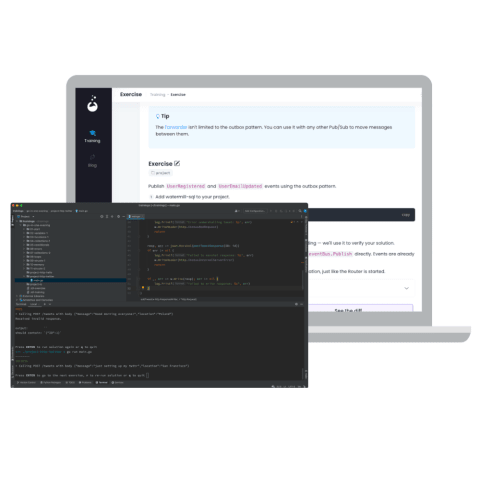#571 — September 24, 2025 |
|
Go Weekly |

|
|
Go's Support for Valgrind Instrumentation — Valgrind is a commonly used instrumentation framework for creating tools that can do profiling and detect various memory management and threading bugs in apps. This still-experimental support for Valgrind in Go opens up a wealth of extra opportunities for low-level diagnostics for Go programs. Roland Shoemaker |
💡 This Hacker News discussion has more details, including a comment from the author of the pull request/CL about what the support was initially intended for. |

Go Event-Driven: From the Watermill Creators — Miłosz and Robert from Three Dots Labs are launching the next edition of their hands-on training. It teaches the tricky parts of event-driven systems such as the outbox pattern, message ordering, and sagas. Don't sleep on this one. Opens autumn 2025. Three Dots Labs sponsor |
|
▶ Twenty Talks from GopherCon UK 2025 — A YouTube playlist containing the just-uploaded talks from last month’s London-based Go conference. Every talk is technical and deep, but you might particularly enjoy Daniel Marti’s What’s Coming in Go 1.25, Roland Shoemaker talking about Go security, or Emily Achieng talking about Go module hygiene and keeping your GopherCon UK |
|
Practical Networking Patterns in Go — A new section of the on-going “Go Optimization Guide” featuring 13 guides to the various topics involved in building scalable, networked Go apps — including benchmarking, how to achieve ‘massive concurrency’, diagnostics, transport protocols, low-level tuning, and more. Alexander Stavonin |
|
IN BRIEF:
|
|
Building Conway’s Game of Life with raylib-go — Just a bit of fun. Here’s the resulting code. Tim Little |
|
Kubernetes CPU Limits and Go — An update of an article from 2024. Go’s runtime doesn’t inherently know that it’s running within a Kubernetes environment, so there are tweaks you can make. However, also bear in mind Go 1.25’s changes to GOMAXPROCS’s defaults. William Kennedy |
|
📄 How Fast is Go? Simulating Millions of Particles on a Smart TV – “Go is able to simulate 2.5 million particles at 60 fps while sending data at 30 fps to in theory over 300 clients, maybe even a thousand.” David Gerrells 📄 Making a Cross-Platform Game using Pion and WebRTC Datachannels – The current setup has some drawbacks, but there’s a lot of potential here if you want to explore it. Srayan Jana 📄 CSRF Protection via Headers in Go 1.25 Jon Calhoun |
🛠 Code & Tools |

|
|
🤖 GoMLX: An Accelerated Machine Learning Framework for Go — A set of machine learning libraries and tools designed to act as a sort-of Go alternative to PyTorch or TensorFlow. Despite the name, it’s not related to Apple’s MLX framework and is actually Linux-only for now. It does, however, open up the opportunity to train and use ML models directly from Go, as Eli Bendersky explains in this introductory post. GoMLX Team |
|
TableWriter 1.1: Render Rich Text-Based Tables — A flexible library for rendering tabular data to ASCII, Unicode, Markdown, HTML, or for colorized terminals. The README is packed with examples. Oleku Konko |
|
Secure Your Agentic Apps with Auth for GenAI — Secure your agentic apps with features like User Authentication for AI agents, Token Vault, and more with Auth0’s Auth for GenAI (exclusively in Developer Preview). Auth0 sponsor |
|
Gojekyll: A Fast Go Implementation of Jekyll — Jekyll is a very popular Ruby-powered static site generator – this is a ‘partially-compatible’ clone that boasts enhanced performance and portability by being written in Go. Worth a look if you have a Jekyll-powered site but want to remove Ruby from your stack. Oliver Steele and Daniil Gentili |
|
Valgo 0.7: An Expressive Validator Library — Type-safe and extensible validator library built upon generics. Rules are written in functions and not in struct tags. v0.7 adds new validation helpers and type-safe validators that remove codegen and width-specific types. Cohesive Stack |
|
Fibratus: Windows Kernel Exploration and Observability Tool — Now pitched as a “adversary tradecraft detection, protection, and hunting” tool, Fibratus captures system events, such as file I/O and network requests, and scans memory, so you can gain insight into what apps are up to. GitHub repo. Fibratus |
|
Go Allocations Explorer Extension for VSCode — Uses your benchmarks to identify and list the allocations inside VS Code. Matt Sherman |
|
